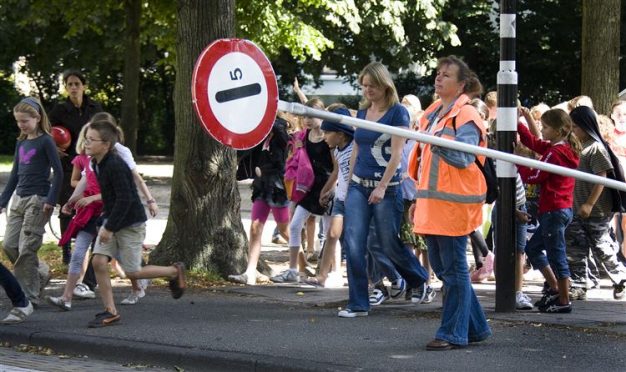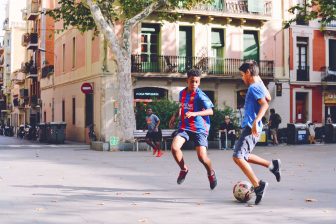
Very few children walk to school and road-safety is the primary barrier
A new study shows that there is a drastic decline in children’s independent mobility due to an increasing number of parents driving their children to and from school. To address this situation, a Dutch organization specializing in traffic safety campaigned for more road-safety in the school-environment.
Back-seat generation
The study carried out by the Dutch Traffic Safety Organization (Veilig Verkeer NL) reveals a startling reduction in levels of children’s independence mobility and an increase in adult supervision. The increasing domination of motor traffic is heavily implicated in the drastic decline in children independent mobility. Controlling motor traffic is important in reversing the decline and improving children’s physical health and mental wellbeing.
“We found that in the last 25 years, the average age in which children in the Netherlands go independently to school has risen from 6,5 to 9 years old. Also during the last decade, the number of children who walk to school has declined by 20% and who cycle by 10%. On the contrary, there has been an increase by 10% in a number of children who are being driven to school,” said Andre de Wit from the Dutch Traffic Safety Organization.
However, cars used for school-related travel contribute to various increasing problems for environments around schools and environments that are regularly encountered by children. Moreover, by adding to the number of vehicles on the roads, they also increase the road-safety risks, especially where children congregate.
“The rapid rise in parents who drive children to school is detrimental to the children’s health and contributes significantly to congestion. Another problem is an increase in accidents near schools,”added de Wit.
Why does Children’s Independent Mobility matter?
According to the research findings, there are many benefits for children who walk or cycle to school.
“For the individual child it means traffic experience. This experience stimulates the independence of children and reduces accidents in later live. Children learn to recognize dangerous situations in traffic and learn skills how to deal with environments like these. Experience they will not gain on the backseat of the car. It also benefits the physical, cognitive and social development of children and their health,” explained de Wit.
The challenge is convincing parents to change their thinking. The research shows that almost 50% per cent of parents consider the lack of safety on the routes to school as the main reason for bringing their child to school by car. However, this represents a vicious cycle as this results in more cars in the school surroundings, which leads to unsafety.
‘A day of cycling walking and cycling’ campaign
“Last year, we organized a “Day of walking and cycling to school’. The aim of this event was to encourage parents to walk and cycle to schools together with their children. Approximately 100,000 children and their parents participated in this exercise,” explained de Wit.
The ‘Day of walking and cycling to school’ proved to be very successful as it reduced the amount of cars in the school environment and it increased road safety.
“Three weeks later there were still more children walking and cycling to their schools and therefore we need to look at solutions to make this behavioural change sustainable for the future”, concluded de Wit.
About Veilig Verkeer NL
Veilig Verkeer NL (Safe Traffic NL) is an association where volunteers and professionals work together to increase road safety, solve dangerous traffic situations and improve the quality of the living environment. It has 42.000 members and donors, about 3000 volunteers and 70 professionals. Formerly known as 3VO –the Dutch National Traffic Safety Organisation –Veilig Verkeer NL is established through the merger of three organisations in The Netherlands: the Safe Traffic Union, the Pedestrians Union and Right of Way for Kids. For more information visit www.veiligverkeernederland.nl




